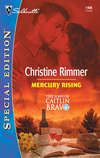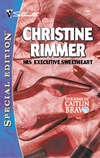Czytaj książkę: «Donovan's Child»

Abilene leaned close to him. “Don’t you wish you’d done this sooner?” Her hair swung forward. He could smell her fresh, tart scent. He wanted to touch her hair. He wanted it bad.
And he had a thousand reasons why he shouldn’t have what he wanted.
To hell with all those reasons.
He lifted his hand from the table and caught a thick lock between his fingers.
He wanted to kiss her, to feel the give, the texture, the heat of her mouth.
She said his name “Donovan,” on a whisper of sound. And he thought that no one, ever, had said his name the way she did. With tenderness. And complete understanding.
With acceptance. And the sweet heat of honest desire.
There was nothing else, at that moment. Just Abilene.
So close to him, leaning closer …
Dear Reader,
Once, Donovan McRae was arguably the finest architect in America. He loved his work and he also enjoyed a reputation as a skilled and daring extreme sports enthusiast—a world-class ice climber. But in the past year, the formerly gregarious genius has completely shut himself off from the world. And no one knows why.
He hasn’t been out of the gorgeous house he designed in the middle of the West Texas high desert a hundred miles from El Paso in months. He’s turned away friends and associates, refusing to see anyone—including Abilene Bravo, who had won the special fellowship he offered before he turned his back on his own life. She’s been waiting a year for the important collaboration with him to begin.
No way can he put her off forever. Eventually, he has to let Abilene in.
And when he does, he’s going to get more than he bargained for. The honest, forthright and optimistic Abilene is not about to let him hide from the world forever. Whether he likes it or not, she’s determined to throw open some windows and doors and let the light in.
Sparks will fly. Guaranteed.
Happy reading everyone,
Christine Rimmer
About the Author
CHRISTINE RIMMER came to her profession the long way around. Before settling down to write about the magic of romance, she’d been everything from an actress to a salesclerk to a waitress. Now that she’s finally found work that suits her perfectly, she insists she never had a problem keeping a job—she was merely gaining “life experience” for her future as a novelist. Christine is grateful not only for the joy she finds in writing, but for what waits when the day’s work is through: a man she loves, who loves her right back, and the privilege of watching their children grow and change day to day. She lives with her family in Oklahoma. Visit Christine at www.christinerimmer.com.
Donovan’s Child
Christine Rimmer

To all of you wonderful readers at eHarlequin
who encouraged me to write this book.
Thank you.
Chapter One
“Impress me,” Donovan McRae commanded from behind a matched pair of enormous computer screens.
The screens sat on a desktop that consisted of a giant slab of ash-colored wood. The slab of wood was mounted on a base hewn from what appeared to be volcanic rock. The desk, the screens and the man were way down at the far end of a long, slant-roofed, skylit space, a space that served as Donovan’s studio and drafting room in his sprawling, half-subterranean retreat in the West Texas high desert.
Impress me?
Abilene Bravo could not believe he’d just said that.
After all, she’d been imagining this moment for over a year now. At first with anticipation, then with apprehension and finally, as the months dragged by, with growing fury. She’d waited so long for this day—and the first words out of the “great man’s” mouth were Impress me?
Hadn’t she already done that? Wasn’t that how she’d won this prize fellowship in the first place?
And would it have killed him to emerge from behind that fortress of screens, to rise from that volcano of a desk, to gesture her nearer, maybe even to go so far as to offer a handshake?
Or, hey. Just, you know, to say hello?
Abilene gritted her teeth and tamped her anger down. She reminded herself that she was not letting her big mouth—or her temper—get the better of her.
She did have something to show him, a preliminary design she’d been tinkering with, tweaking to perfection, for months as she waited for this all-important collaboration to begin. Donovan’s assistant had led her to a workstation, complete with old-school drafting table and a desk, on which sat a computer loaded up with the necessary computer-assisted design software.
“Well?” Donovan barked at her, when she didn’t respond fast enough. “Do you have something to show me or not?”
Abilene saw red, and again ordered her heart to stop racing, her blood not to boil. She said, in a voice that somehow stayed level, “I do, yes,” as she shoved her memory stick into an empty port.
A few clicks of the mouse and her full-color introductory drawing materialized in front of her. On his two screens, Donovan would be seeing it, too.
“My rendering of the front elevation,” she said.
“Self-evident,” he grumbled.
By then, her hand was shaking as she operated the mouse. But beyond that slight tremor, she kept herself well under control as she began to show him the various views—the expanded renderings of classrooms, the central cluster of rooms for administration, the negative spaces that made up the hallways, the welcome area, the main entrance and vestibule.
She intended to cover it all, every square inch of the facility, which she had lovingly, painstakingly worked out—the playgrounds, the pool area, even the parking lot and some general landscaping suggestions. From there, she would go into her rough estimate on the cost of the project.
But she didn’t get far. Ninety seconds into her presentation, he started in on her.
“Depressing,” he declared darkly from behind his wall of monitors. “Institutional in the worst sense of the word. It’s a center for underprivileged children, not a prison.”
It was too much—all the months of waiting, the wondering and worrying if the fellowship was even going to happen. Then, out of nowhere, at last—the call.
That was yesterday, Sunday, the second of January. “This is Ben Yates, Donovan McCrae’s personal assistant. Donovan asked me to tell you that he’s ready to begin tomorrow. And to let you know that instructions will be sent via email….”
She’d had a thousand questions. Ben had answered none of them. He’d given her a choice. She could be flown to El Paso and he would pick her up there. Or she could drive her own vehicle.
She’d opted to drive, figuring it was better to have her own car in a situation like this. In order to arrive before dark, she’d been on the road before the sun came up that morning.
The drive was endless. An eight-hour trek across the wide-open, windblown desert to this godforsaken corner of Texas.
And now she was here, what? She’d met the great man at last. And she found him flat-out rude. As well as dismissive of her work.
He demanded, “What were you thinking to bring me lackluster crap like this?”
Okay, worse than dismissive.
The man was nothing short of brutal. He’d seen a fraction of what she’d brought. And yet he had no compunction about cutting her ideas to shreds.
Abilene had had enough. And she said exactly that. “Enough.” She closed her files and ejected her memory stick.
“Excuse me?” came the deep voice from behind the screens. He sounded vaguely amused.
She shot to her feet. Upright, at least she could see the top half of his head—the thick, dark gold hair, the unwavering gray-blue eyes. “I waited a very long time for this. But maybe you’ve forgotten that.”
“I’ve forgotten nothing,” was the low reply.
“We were to have started at the beginning of last year,” she reminded him.
“I know when we were scheduled to start.”
“Good. So have you maybe noticed that it’s now January of the next year? Twelve months I’ve been waiting, my life put virtually on hold.”
“There is no need to tell me what I already know. My memory is not the least impaired, nor is my awareness of the passage of time.”
“Well, something is impaired. I do believe you are the rudest person I’ve ever met.”
“You’re angry.” He made a low sound, a satisfied kind of sound.
“And that makes you happy?”
“Happy? No. But it does reassure me.”
He found it reassuring that she was totally pissed off at him? “I just don’t get it. There’s such a thing as common courtesy. You could at least have allowed me to finish my presentation before you started ripping my work apart.”
“I saw enough.”
“You saw hardly anything.”
“Still. It was more than enough.”
By then, she just didn’t care what happened—whether she stayed, or whether she threw her suitcases back into her car and headed home to San Antonio. She spoke with measured calm. “I would really like to know what you were doing all year, that you couldn’t even be bothered to follow through on the fellowship you set up yourself. There are kids out there who desperately need a center like this one is supposed to be.”
“I know that.” His voice was flat now. “You wouldn’t be here now if I didn’t.”
“So then, what’s up with you? I just don’t get it.”
Unspeaking, he held her gaze for a solid count of five. And then, bizarrely, without moving anything but his arms, he seemed to roll backward. His torso turned, his arms working.
He rolled out from behind the massive desk—in a wheelchair.
Chapter Two
A wheelchair.
Nobody had mentioned that he was using a wheelchair.
Yes, she’d heard that he’d had some kind of accident climbing some snow-covered mountain peak in some distant land. But that was nearly a year ago. She’d had no clue the accident was bad enough for him to still need a wheelchair now.
“Oh, God. I had no idea,” she heard herself whisper.
He kept on rolling, approaching her down the endless length of the room. Beneath the long sleeves of the knit shirt he wore, she could see the powerful muscles of his arms bunching and releasing as he worked the wheels of the chair. He didn’t stop until he was directly in front of her.
And then, for several excruciating seconds, he stared up at her as she stared right back at him.
Golden, she thought. He was as golden up close and personal as in the pictures she’d seen of him. As golden as from a distance, on a stage, when she’d been a starry-eyed undergraduate at Rice University and he’d come to Houston to deliver an absolutely brilliant lecture on form, style and function.
Golden hair, golden skin. He was a beautiful man, broad-shouldered and fit-looking. A lion of a man.
Too bad about the cold, dead gray-blue eyes.
He broke the uncomfortable silence with a shrug. “At least you’re no doormat.”
She thought of the apology she probably owed him. She really should have considered that there might be more going on with him than sheer egotism and contempt for others.
Then again, just because he now used a wheelchair didn’t mean he had a right be a total ass. A lot of people faced difficult challenges in their lives and still managed to treat others with a minimum of courtesy and respect.
She returned his shrug. “I have a big mouth. It’s true. And my temper rarely gets the better of me. But when it does, watch out.”
“Good.”
It wasn’t exactly the response she’d expected. “It’s good that I never learned when to shut up?”
“You’ve got guts. I like that. You can be pushed just so far and then you stand up and fight. You’re going to need a little fighting spirit if you want to have a prayer of saving this project from disaster.”
She didn’t know whether to be flattered—or scared to death. “You make it sound as though I would be doing this all on my own.”
“Because you will be doing this all on your own.”
Surely she hadn’t heard him right. Caught by surprise, she fell back a step, until she came up against the hard edge of the drafting table. “But …” Her sentence trailed off, hardly begun.
It was called a fellowship for a reason. Without his name and reputation, the project would never have gotten the go-ahead in the first place. The San Antonio Help the Children Foundation was all for giving a bright, young hometown architect a chance. But it was Donovan McCrae they were counting on to deliver. He knew that every bit as well as she did.
The ghost of a smile tugged at the corners of his perfectly symmetrical mouth. “Abilene. You’re speechless. How refreshing.”
She found her voice. “You’re Donovan McCrae. I’m not. Without you, this won’t fly and you know it.”
“We need to carry through.”
“You noticed. Finally.”
A slow, regal dip of that leonine head. “I’ve put this off for way too long. And as you’ve already pointed out, there’s a need for this center. An urgent need. So I’ll … supervise. At least in the design phase. I’ll put my stamp of approval on it when I’m satisfied with what you’ve done. But don’t kid yourself. If it gets built, the design will be yours, not mine. And you will be following through in construction.”
Abilene believed in herself—in her talent, her knowledge, and her work ethic. Yes, she’d hoped this fellowship would give her a leg up on snaring a great job with a good firm. That maybe she’d be one of the fortunate few who could skip the years of grunt work that went into becoming a top architect. But to be in charge of a project of this magnitude, at this point in her career?
It killed her to admit it, but she did anyway. “I don’t know if I’m ready for that.”
“You’re going to have to be. Let me make this very clear. I haven’t worked in a year. I doubt if I’ll ever work again.”
Never work again?
That would be a crime. She might not care much for his personality. But he was, hands down, the finest architect of his generation. They spoke of him in the same breath with Frank O. Gehry and Robert Venturi. Some even dared to compare him favorably to Frank Lloyd Wright. He blended the Modern with the Classical, Bauhaus with the Prairie style, all with seeming effortlessness.
And he was still young. Not yet forty. Many believed an architect couldn’t possibly hit creative stride until at least the age of fifty. There was just too much to learn and master. Donovan McCrae’s best work should be ahead of him.
“Never work again …” She repeated the impossible words that kept scrolling through her mind.
“That’s right.” He looked … satisfied. In a bleak and strangely determined sort of way.
“But why?” she asked, knowing she was pushing it, but wanting to understand what, exactly, had happened to him to make him turn his back on the kind of career that most would kill for. “I mean, there’s nothing wrong with your brain, is there?”
An actual chuckle escaped him. “You do have a big mouth.”
She refused to back off. “Seriously. Have you suffered some kind of brain damage?”
“No.”
“Then why would you stop working? I just don’t get it.”
Something flashed in those steel-blue eyes of his. She sensed that he actually might give her an answer.
But then he only shook his head. “Enough. I’ll take that memory stick.” He held out his hand.
She kept her lips pressed together over a sarcastic remark and laid the stick in his open palm.
He closed his fingers around it. “Ben will show you to your rooms. Get comfortable—but not too comfortable.” He backed and turned and wheeled away from her, disappearing through a door beyond the looming edifice that served as his desk.
“Abilene?” said a quiet voice behind her. She turned to face Ben Yates, who was slim and tall and self-contained, with black hair and eyes to match. “This way.”
She grabbed her bag off the back of her chair and followed him.
The house was a marvel—like all of Donovan McCrae’s designs. Built into the side of a rocky cliff, it had seemed to Abilene, as she approached it earlier, to materialize out of the desert: a cave, a fortress, a palace made of rock—and a house—all at the same time.
It was built around a central courtyard. The back half nestled into the cliff face. It had large glass doors and floor-to-ceiling windows all along the courtyard walls, giving access to the outside and great views of the pool and the harsh, beautiful landscaping. The facade side had windows and glass doors leading to the courtyard, as well. It also offered wide vistas of the wild, open desert.
Abilene’s rooms were on the cliff side.
Ben ushered her in ahead of him. “Here we are.”
The door was extra wide. The one to the bedroom was wide, as well. She ran her hand down the rough-hewn doorframe.
Ben said, “Donovan had all the rooms made wheelchair-accessible, so it would be possible for him to get around anywhere in the house.”
She set her leather tote on a long table by the door and made a circuit. First of the sitting room, then of the bedroom. She looked into the walk-in closet where her own clothes were already hanging, and also the bathroom with its open shower and giant sunken tub.
The walls of the place seemed hewn of the rock face itself. And the furniture was rustic, made from twisted hunks of hardwood, starkly beautiful, like the desert landscape outside. French doors led out to the pool, and to the paths that wound through the courtyard.
Donovan’s assistant waited for her near the door. “The pool is yours to use as long as you’re here. There’s also a large gym downstairs. Check with me if you want to work out there and I’ll give you a schedule. Donovan uses the gym several hours a day and prefers to do so alone. The desk, computer and drafting table you used today in the studio are yours whenever you need them. Anytime you’re hungry, the kitchen is to your left as you exit your rooms. Just keep going until you reach it. Or you can ring. Press the red button on the phone. The housekeeper will answer and see that you get anything you need.”
“I know I’ll be very comfortable. Thank you.”
“I had your suitcases unpacked for you.”
She gave him a wry smile. “You assumed I would stay?”
“I did, yes.”
“I have to tell you, it was touch and go back there in the studio. Your boss can be rude.”
Apparently, Ben felt no obligation to leap to Donovan’s defense. He spoke in his usual calm, unruffled tone. “Don’t let him run you off.”
“I won’t. It’s a promise.”
“That’s the spirit.” Did he almost smile? She couldn’t be sure. “Drinks at seven, just you and Donovan.”
“That sounds really fun.” She said it deadpan.
Ben took her meaning. “Only if you feel up to it. If you’d prefer, I can have something sent here, to your rooms.”
“I definitely feel up to it.”
“Excellent. If you follow either the courtyard breeze-way or the interior hall in either direction, you’ll eventually reach the front living room off the main entrance. Or you can simply cross the courtyard. It’s chilly out, but not too bad.”
“I’m sure I can find my way.”
“Good, then. If you need anything—”
“I know. Press the red button on the house phone.”
“I’ll see you at dinner.” He turned to go.
“Ben?”
He paused in the doorway, his back to her.
“I had no idea Donovan was in a wheelchair.”
A silence. And then, reluctantly, he turned to her again. “Yes. Well, he’s very protective of his privacy lately.”
“A little communication goes a long way.”
“You should be discussing this with him.”
“Probably. What happened to him?”
Ben frowned. She was sure he would blow her off—or tell her again to ask Donovan. But then he surprised her and gave it up. “You may have heard about the ice-climbing accident.”
“Just that there was one.”
“He fell several hundred feet. Both legs sustained multiple fractures. His right tibia was driven up through the knee joint into the thigh.”
She forced herself not to wince. “So … it’s not his spine? I mean, he’s not paralyzed?”
“No, he’s not paralyzed.”
“Will he walk again?”
“It’s likely. But with … difficulty—and I’ve said more than enough. Seven. Drinks in the front living area.”
And he was gone.
Abilene got out of her tired traveling clothes and jumped in the shower. In twenty minutes, she was freshened up and ready to go again. She considered exploring the house a little but decided to ask Donovan to show her around personally later. It might be a way to break the ice between them.
If such a thing was possible. The man was as guarded as they came. She had her work cut out for her, to try to get to know him a little.
Stretching out across the big bed, she stared up at the ceiling fixture, which consisted of tangled bits of petrified wood interwoven with golden globe-shaped lights that seemed strung on barbed wire. With a sigh, she let her eyes drift shut. Maybe what she really needed about now was a nice little nap….
The faint sound of her cell ringing snapped her awake. She went to the sitting room to get it. The display read Mom.
She answered. “I’m here. Safe. Don’t worry.”
“Just what I needed to know. Your father sends his love.”
“Love to him, too. Did Zoe and Dax get away all right?” Saturday, which had been New Year’s day, Abilene’s baby sister had married her boss and the father of her coming baby. The newlyweds were to have left for their honeymoon on Maui that morning.
“They’re on their way,” her mother said. “Dax says to say hi to Donovan.” Zoe’s groom and Donovan were longtime acquaintances. “And your sister says to tell your new mentor that he’d better treat you right.”
“I’ll give him the message—both of them,” Abilene promised.
“Have you … spoken with him yet?” Aleta Bravo asked the question carefully. She knew how upset Abilene had been with the whole situation.
“We spoke, yes. We … had words, I guess you could say. He was rude and dismissive. I was forced to tell him off.”
“Should I be concerned?”
“Not as of now. I’ll keep you posted.”
“You can always simply come home, you know. It won’t be that difficult to find a place for yourself. You’re a Bravo. And you graduated at the top of your class.”
“Mom. There are plenty of architects. But an architect who’s worked closely with Donovan McRae, now that’s something else altogether. A fellowship like this—one-on-one with the best there is—it just doesn’t happen very often.”
She considered adding that Donovan had been facing some serious challenges lately and possibly deserved a little slack for his thoughtless behavior. That he used a wheelchair now.
But no. Ben had made it painfully clear that McRae didn’t want the world butting into his private business. She would respect his wishes. At least until she understood better what was going on with him.
Aleta said, “You’re determined to stay, then?”
“Yes, I am.”
“Well, then I suppose I won’t be changing your mind….”
“No. You won’t.” And then, from her mother’s end of the line, faintly, she heard the deep rumble of her father’s voice.
Aleta laughed. “Your father says to give him hell.”
“I will. Count on it.”
After she said goodbye to her mom, she checked in with Javier Cabrera.
Javier was an experienced builder—and the first person she’d called when she got the summons yesterday from Ben. He owned his own company, Cabrera Construction, and had been kind enough to hire Abilene to work as a draftsperson on a few of his projects over the endless months she’d been waiting to get started on the fellowship. He’d even allowed her to consult with him at his building sites, giving her the chance to gain more hands-on experience in construction. He had become not only her friend, but something of a mentor as well.
His connections to her family were long-standing and complicated. Once the Bravos and the Cabreras had been mortal enemies. But now, in the past few years, the two families seemed to have more in common than points of conflict.
“Abby,” Javier said warmly when he answered the phone. “I was wondering about you.”
“I’ll have you know I have made it safely to Donovan McRae’s amazing rock house in the middle of nowhere.”
“Did he tell you how sorry he was for all the time he made you wait and wait?”
“Not exactly.”
“You get in your car and you come back to SA. I have work for you. Plenty of work.”
She smiled at the driftwood and barbed-wire creation overhead. “You’re good to me.”
“I know talent. You will go far.”
“You always make me feel better about everything.”
“We all need encouragement.” He sounded a little sad. But then, Javier was sad. He was still deeply in love with his estranged wife, Luz.
Abilene confided that Donovan had said her design was crap.
Javier jumped to her defense, as she had known that he would. “Don’t listen to him. Your design is excellent.”
“My design is … workmanlike. It needs to be better than that.”
“You’re too hard on yourself.”
“I have to be hard on myself. I want to be the best someday.”
“Stand tall,” he said. “And call me any time you need to talk to someone who understands.”
“You know I will.”
They chatted for a bit longer. When she hung up, it was ten minutes of seven. She combed her hair and freshened her lip gloss and walked across the courtyard to the front of the house.
Donovan was waiting for her.
He sat by the burled wood bar, watching, as she approached the French doors from the courtyard.
She wore a slim black skirt, a button-down shirt with a few buttons left undone and a long strand of jade-colored beads around her neck. Round-toed high heels showed off her shapely legs, and her thick chestnut hair fell loose on her slim shoulders.
She pushed open one of the doors and stepped inside as if she owned the place. There was something about her that had him thinking of old movies, the ones made way back in the Great Depression. Movies in which the women were lean and tall and always ready with a snappy comeback.
From that first moment in the afternoon, when Ben ushered her into the studio, he had felt … annoyed. With her. With the project. With the world in general. He wasn’t sure exactly why she annoyed him. Maybe it was all the energy that came off her, the sense of purpose and possibility that seemed to swirl around her like a sudden, bracing gust of winter wind.
Donovan didn’t want bracing. What he wanted was silence. Peace. To be left alone.
But he had chosen her, sight unseen, by the promise in the work she’d submitted, before it all went to hell. And he would, finally, follow through on his obligation to the Foundation people. And to her.
They were doing this thing.
She spotted him across the room. Paused. But only for a fraction of a second. Then she kept coming, her stride long and confident.
He poured himself a drink and set down the decanter of scotch. “What can I get you?”
“Whatever you’re having.” She nodded at the decanter. “That’s fine.”
“Scotch? Don’t women your age prefer sweet drinks?” Yeah. All right. It was a dig.
She refused to be goaded. “Seriously. Scotch is fine.”
So he dropped ice cubes into a crystal glass, poured the drink and gave it to her, placing it in her long-fingered, slender hands. They were fine hands, the skin supple, the nails unpolished and clipped short. Useful hands.
She sipped. “It’s good. Thanks.”
He nodded, gestured in the direction of a couple of chairs and a sofa. “Have a seat.” She turned and sauntered to the sofa, dropping to the cushions with artless ease.
He put his drink between his ruined legs and wheeled himself over there, rolling into the empty space between the chairs. “Your rooms?”
“They’re perfect, thanks. Is it just you and Ben here?”
“I have a cook and a housekeeper—a married couple, Anton and Olga. And a part-time groundskeeper to look after the courtyard and the perimeter of the house.” He watched her cross her pretty legs, admired the perfection of her knees. At least she was a pleasure to look at. “Did you rest?”
“I had a shower. Then my mother called. She told me to tell you that Dax sends his regards and my sister says you’d better be nice to me.”
“Your sister and Dax …?”
“They were married on Saturday. And left on their honeymoon this morning.”
“I hope they’ll be very happy,” he said without inflection. “And then what did you do?”
“Does that really matter to you?”
“It’s called conversation, Abilene.”
Her expression was mutinous, but she did answer his question. “After I talked to my mother, I called a … friend.”
He took note of her hesitation before the word, friend. “A lover, you mean?”
She laughed, a low, husky sound that irked him to no end. A laugh that said he didn’t intimidate her, not with his purposeful rudeness, nor with his too-personal questions. “No, not a lover. Javier is a builder. A really good one. I’ve been working for him over the past year, on and off. He also happens to be my half sister Elena’s father. And the adoptive father of my sister-in-law, Mercedes.”
He sipped his scotch. “All right. I’m thoroughly confused.”
“I kind of guessed that by the way your eyes glazed over.”
“Maybe just a few more details …”
She swirled her glass. Ice clinked on crystal. “My father and Javier’s wife, Luz, had a secret affair years ago.”
“An adulterous affair, that’s what you’re telling me.”
“Yes. That’s what I’m telling you. Luz was married to Javier. My dad to my mom. The affair didn’t last long.”
“Did your father love your mother?”
“He did—and he does. And I believe that Luz loved—and loves—Javier. But both of their marriages were troubled at the time.”
Darmowy fragment się skończył.




















